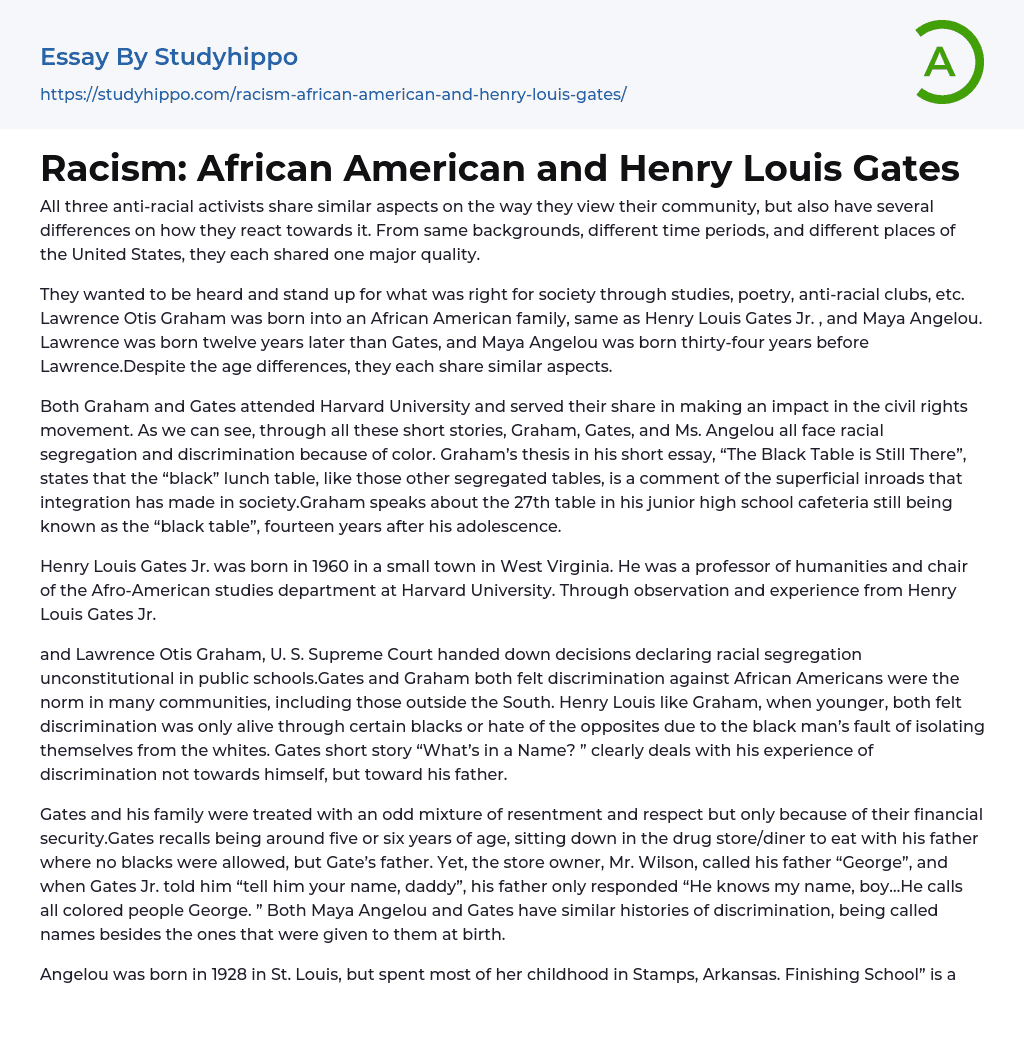All three anti-racial activists share similar aspects on the way they view their community, but also have several differences on how they react towards it. From same backgrounds, different time periods, and different places of the United States, they each shared one major quality.
They wanted to be heard and stand up for what was right for society through studies, poetry, anti-racial clubs, etc. Lawrence Otis Graham was born into an African American family, same as Henry Louis Gates Jr. , and Maya Angelou. Lawrence was born twelve years later than Gates, and Maya Angelou was born thirty-four years before Lawrence.Despite the age differences, they each share similar aspects.
Both Graham and Gates attended Harvard University and served their share in making an impact in the civil rights movement. As we can see, through all these short stories, Graham, Gates, and Ms.
...Angelou all face racial segregation and discrimination because of color. Graham’s thesis in his short essay, “The Black Table is Still There”, states that the “black” lunch table, like those other segregated tables, is a comment of the superficial inroads that integration has made in society.Graham speaks about the 27th table in his junior high school cafeteria still being known as the “black table”, fourteen years after his adolescence.
Henry Louis Gates Jr. was born in 1960 in a small town in West Virginia. He was a professor of humanities and chair of the Afro-American studies department at Harvard University. Through observation and experience from Henry Louis Gates Jr.
and Lawrence Otis Graham, U. S. Supreme Court handed down decisions declaring racial segregation unconstitutional in public schools.Gates and Graham both felt discrimination against
African Americans were the norm in many communities, including those outside the South. Henry Louis like Graham, when younger, both felt discrimination was only alive through certain blacks or hate of the opposites due to the black man’s fault of isolating themselves from the whites. Gates short story “What’s in a Name? ” clearly deals with his experience of discrimination not towards himself, but toward his father.
Gates and his family were treated with an odd mixture of resentment and respect but only because of their financial security.Gates recalls being around five or six years of age, sitting down in the drug store/diner to eat with his father where no blacks were allowed, but Gate’s father. Yet, the store owner, Mr. Wilson, called his father “George”, and when Gates Jr. told him “tell him your name, daddy”, his father only responded “He knows my name, boy…He calls all colored people George. ” Both Maya Angelou and Gates have similar histories of discrimination, being called names besides the ones that were given to them at birth.
Angelou was born in 1928 in St. Louis, but spent most of her childhood in Stamps, Arkansas. Finishing School” is a story of Angelou’s childhood through her own eyes. “Finishing school” was to refine social skills and artistic skills for future roles in a “polite society”, so it was called. Children of the poor, both black and white, were expected to learn practical skills that would enable them to get jobs. Angelou recalls that black women were often limited to domestic service in white households.
Ms. Angelou spent most of her “finishing school” in an “old, fat, white” lady’s kitchen
preparing tables and cooking meals for Ms. Cullinan and guests.She recalls being renamed Mary because her birth name was too long and it was just better for Ms.
Cullinan’s convenience. Both Angelou and Gates knew that it was a dangerous practice to call a Negro anything that could be loosely insulting because of the centuries they have been called niggers, jigs, boots, spooks, etc. So for the white’s sake they just wanted to completely rename them. Yet, being called “George” or “Mary” is still considered prejudiced. All three activists know and speak out and state through literature, that racism is sill alive but well concealed.
- African American essays
- African American Culture essays
- American Values essays
- Asian American essays
- Chinese essays
- Ethnicity essays
- Ethnocentrism essays
- German essays
- Han Chinese essays
- Hispanic essays
- Identity essays
- Korean essays
- Mexican essays
- Nation essays
- Native American essays
- Race and Ethnicity essays
- White People essays
- Black People essays
- Aldous Huxley essays
- Alice Walker essays
- Amy tan essays
- Anne Bradstreet essays
- Anton Chekhov essays
- Arthur Miller essays
- Augustine essays
- Bertolt Brecht essays
- Booker T Washington essays
- Carol ann duffy essays
- Charles Dickens essays
- Charlotte Perkins Gilman essays
- Chinua Achebe essays
- Christina Rossetti essays
- Consider The Lobster essays
- Edgar Allan Poe essays
- Elizabeth Bishop essays
- Emily Dickinson essays
- Ernest Hemingway essays
- F. Scott Fitzgerald essays
- George Orwell essays
- Harper Lee essays
- Homer essays
- James Baldwin essays
- Jane Austen essays
- John Donne essays
- John Steinbeck essays
- Kate Chopin essays
- Kurt Vonnegut essays
- Langston Hughes essays
- Leonardo Da Vinci essays
- Mark Twain essays




